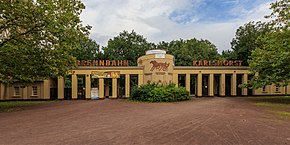Wedding at the Bear Farm
| Movie | |
|---|---|
| Original title | Wedding at the Bear Farm |
| Country of production | Germany |
| original language | German |
| Publishing year | 1942 |
| length | 105 minutes |
| Age rating | FSK 12 |
| Rod | |
| Director | Carl Froelich |
| script |
Jochen Kuhlmey Gustav Lohse |
| production | Carl Froelich Friedrich Pflughaupt |
| music | Theo Mackeben |
| camera | Günther Anders |
| cut | Johanna Schmidt |
| occupation | |
| |
Wedding at Bärenhof is the title of a literary film adaptation from 1942 directed by Carl Froelich . Wedding at Bärenhof is based on Hermann Sudermann's story Jolanthe's wedding , subtitle The story of a love from better days . The film is partly known as Jolanthe's wedding .
action
Our Uhlans : August 16, 1870 - Attack at Mars-la-Tour during the Franco-Prussian War - “But it was a blood kick, a death ride, low the lances - high the flags! So we blew them apart - cuirassiers and lancers! "
25 years later, August 16, 1895: A lavish party takes place at Gut Bärenhof in the house of Baron Maximilian von Hanke, who in 1870 was one of the bravest and bravest Uhlans. The Uhlan officer Lothar von Pütz, to whom Baron von Hanke is a fatherly friend, meets Roswitha von Krakow here. The two young people understand each other immediately and dance the whole evening together. When he introduces himself to Roswitha's full name, the young woman is startled. Their families have been enemies for as long as they can remember. It's about the rights to a meadow property that both parties claim for themselves. Lothar, however, disregards Roswitha's concerns and says what they have to do with the enmity of their fathers. A servant bursts into the exuberant mood and hands Lothar von Pütz a telegram . Lothar has to go home immediately; his father is dying. He affectionately says goodbye to Roswitha.
Gut Poggenhagen, which Lothar inherited from his father, is heavily in debt. When the young officer plays with the idea of selling the property, Baron von Hanke, who feels obliged to his only friend and his son, intervenes and takes responsibility for the debts. He loves Lothar as if it were his own son. He also wants to ensure that the unfortunate legal dispute between the von Pütz and von Krakow families is finally resolved. When he wanted to talk to Leonhard von Krakow about it, the poltrig East Prussian first praised his daughter Roswitha and told his wife and daughter that there was a suitor . The ladies are more than embarrassed. When von Hanke wants to address the process, von Krakow overreacts and is outraged that the name “von Pütz” is taboo in his house. It is only thanks to Roswitha's pleading look that this was not his first and last visit to the Krakow house. Leonhard von Krakow would be more than happy with Baron von Hanke, even if he is much older than his daughter, as a son-in-law, because the baron is the wealthiest man in the whole area.
When Lothar von Pütz and Roswitha finally meet again, they happily embrace and kiss. Lothar tells Roswitha about a horse race that he intends to win in order to be able to stand in front of her father with his head held high. Roswitha sneaks out of the house at night to support Lothar in the army race that takes place in Berlin-Karlshorst . Lothar's joy is great. He gives the young woman his, as he emphasizes, the last 3,000 marks and asks her to put everything on him and his horse, since he is an outsider, the profit is correspondingly high if he wins. Roswitha hesitates and then decides not to bet the money so that Lothar doesn't end up completely penniless. Then she has to watch in horror as Lothar dashes through the finish line first. When he rushes towards her, beaming with joy, and asks her whether she has already picked up the 60,000 marks she has won, she has to confess the truth to him. A dispute ensues between the two of them, at the end of which they separate in disappointment. Back at home, Roswitha gets into trouble with her father, who offers her Baron von Hanke as her future husband. To his great astonishment, Roswitha agrees. During a visit to the Krakows, Roswitha Max von Hanke, who notices the young woman's grief, confesses that it is the parents' wish that he propose to her. But she also tells him that she feels very comfortable around him. Von Hanke, a decent man, asks Roswitha to rethink everything and write him a letter if she knew what she really wanted. Only then would he go to see her parents. After Roswitha informed him of her decision by letter, von Hanke asked her parents for her hand. He assures the young woman that he will do everything possible to make her happy. Since Baron von Hanke knows nothing of the close ties between Roswitha and Lothar von Pütz, his young friend naturally also receives an invitation to a hen party . He does not accept Lothar's objection that he cannot attend the festival. The baron made it clear to his father-in-law, Leonhard von Krakow, that his only condition at a wedding was to put down the dispute with Lothar von Pütz. Krakow, always looking to his advantage, says that if he gets Rubens , then he will forego the few acres of meadow and the argument with von Pütz can be settled.
When Max von Hanke introduced Roswitha and Lothar to each other on the evening of the festival, he was amazed at how reserved the two of them were to each other. Von Hanke tries to get his nervousness under control by giving plenty of alcohol. When the talkative government councilor gives a speech that ends with the words " So check whoever binds himself forever" ... he adds the conclusion "whether the heart finds its way to the heart!" And then also wants to give a speech, however, to the Disaster device. Roswitha lovingly stops him and leaves the ballroom amidst the laughter of individuals. Roswitha and Lothar follow him. He asks the two of them to dance the bride dance, he now needs a little time to think. Standing to one side, Max von Hanke watches the amusing company a little later when he witnesses a conversation between Lothar von Pütz and Roswitha, who implores his foster son that he shouldn't leave her alone. When the Baron wants to send Lothar away, Roswitha says that she couldn't live without Lothar. Von Hanke now wants to know everything. When the two have finished with their story, the good heart of the gentleman from the bear farm is shown once again. He thinks that when two young people love each other, it is their duty to overcome all doubts. As pragmatic as he is, he comes to terms with the situation and gives his two dearest people his blessing. He also assures them of his support in building up Gut Poggenhagen. The three of them enter the ballroom together. Von Hanke informs his guests that he is no longer a bridegroom, that with a heavy heart he renounced this lovely creature at his side, because Roswitha could only be really happy at the side of Lothar von Pütz. When Roswitha's father protests that he wanted to see his daughter as mistress at Bärenhof, he says with a laugh that he shouldn't get upset because they would get Bärenhof anyway. "So," he says, "and now turn this unsuccessful hen party into a fun engagement and your wedding will take place at my place at the Bear Farm!"
background
The shooting took place between August 18 and the beginning of November 1941. The film was shot in Berlin-Karlshorst and in the Ufastadt in Babelsberg .
On June 8, 1942, the film premiered in two cinemas in Berlin . In Austria the film was made under the title Jolanthe's Wedding .
It is a film by Universum Film ( UFA ). The film is one of the entertainment films under National Socialism . It was on the list of German films banned under Allied military censorship .
Silent film star Rudolf Klein-Rogge played his last film role here in the Third Reich with the Medical Council. The song I love you way too much was performed by Ilse Werner .
The production costs were RM 1.531 million.
Reviews
“Comedy-burlesque love story from the circles of East Prussian squires around 1900, routine but very theatrical. Heinrich Georges and Paul Wegener's art of representation is still convincing, and they raise the film to a remarkable level. "
“A romantic comedy set in East Prussian aristocratic circles around the turn of the century, with which Carl Froehlich (" It was a rushing ball night ") attempted to liven up German audiences during the Second World War. While the young lovers Ilse Werner and Ernst von Klipstein strive hard, it is above all the two old stars Heinrich George and Paul Wegener who give the film a certain charm through their acting performances. "
media
DVD release
- Wedding at Bärenhof - 'German film classics' series - Warner Home Video, release date: June 17, 2005
- Wedding at Bärenhof - DVD / BLU-RAY - Black Hill Pictures GmbH, date of publication January 29, 2010 (additional information: bio and filmography by Heinrich George, Ilse Werner, Paul Wegener, Lina Carstens and Ernst von Klipstein, picture gallery)
See also
Web links
- Wedding on Bärenhof in the Internet Movie Database (English)
- Wedding at the Bear Farm - Movie Poster
- Wedding at Bear Farm - Revival poster
- Wedding at the Bear Farm - Illustrated Filmkurier
- Wedding at Bärenhof - today's program
Individual evidence
- ^ Vionville / Mars-la-Tour - poem from that time
- ↑ Wedding at Bärenhof. In: Lexicon of International Films . Film service , accessed March 2, 2017 .
- ↑ kino.de Hochzeit auf Bärenhof ( page no longer available , search in web archives ) Info: The link was automatically marked as defective. Please check the link according to the instructions and then remove this notice. Video.de

